
Acacia murrayana is a tree in the family Fabaceae. It has numerous common names, including sandplain wattle, Murray's wattle, fire wattle, colony wattle and powder bark wattle that is endemic to arid areas in every mainland State except Victoria.
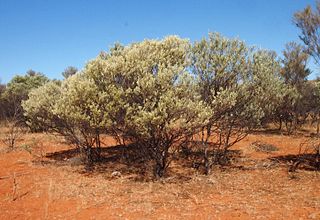
Acacia cuthbertsonii is a perennial shrub or tree native to arid parts of inland and north western Australia.
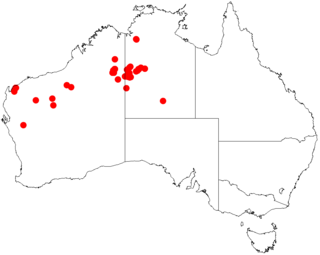
Acacia pachycarpa is a tree or shrub belonging to the genus Acacia and the subgenus Juliflorae that is endemic to central and western parts of northern Australia.
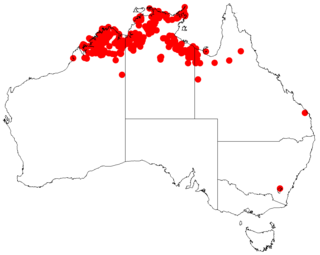
Acacia plectocarpa is a tree or shrub belonging to the genus Acacia and the subgenus Juliflorae that is endemism to north western Australia.

Acacia rhodophloia, commonly known as minni ritchi or western red mulga, is a tree or shrub belonging to the genus Acacia and the subgenus Juliflorae that is endemic to a large area of arid central western Australia. The Indigenous group the Kurrama peoples know the plant as mantaru.
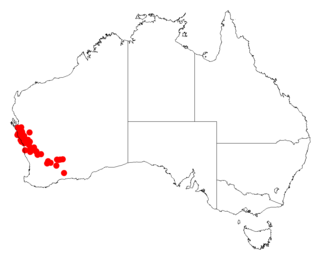
Acacia signata is a tree or shrub belonging to the genus Acacia and the subgenus Juliflorae that is endemic to western Australia.

Acacia wanyu, commonly known as wanyu or silver-leaf mulga, is a shrub or tree belonging to the genus Acacia and the subgenus Juliflorae that is endemic to arid parts of western Australia. The Kurrama people know it as Murruturu or Yirritiri while the Nyangumarta people know it as Wayartany.

Acacia ampliceps, also known as salt wattle, is a shrub or tree belonging to the genus Acacia and the subgenus Phyllodineae that is native to north western parts of Australia.

Acacia jennerae is a shrub or tree belonging to the genus Acacia and the subgenus Phyllodineae that is endemic to arid parts of central Australia.
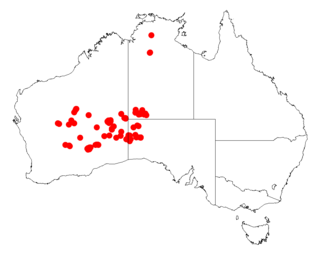
Acacia helmsiana, commonly known as Helm's wattle, is a shrub of the genus Acacia and the subgenus Plurinerves that is endemic to arid areas of central and western Australia.
Acacia manipularis is a shrub of the genus Acacia and the subgenus Plurinerves that is endemic to north western Australia.

Acacia nyssophylla, commonly known as pin bush, wait a while and spine bush, is a shrub of the genus Acacia and the subgenus Plurinerves that is endemic to a large area of central and south-western and southern Australia.
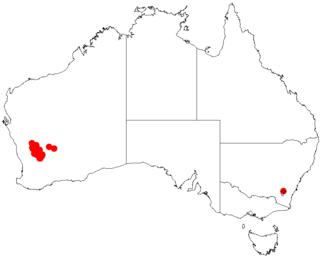
Acacia obtecta is a shrub of the genus Acacia and the subgenus Plurinerves that is endemic to a small area in south western Australia.

Acacia pharangites, commonly known as Wongan gully wattle, is a shrub of the genus Acacia and the subgenus Plurinerves that is endemic to a small area of south western Australia and is listed as endangered according to the Environment Protection and Biodiversity Conservation Act 1999.
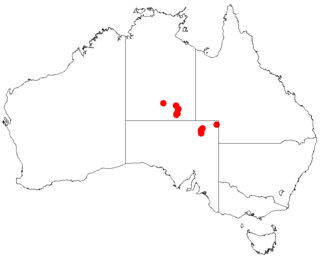
Acacia pickardii, commonly known as Pickard's wattle or birds nest wattle, is a tree or shrub belonging to the genus Acacia and the subgenus Phyllodineae native to eastern Australia. It is listed as a vulnerable species according to Environment Protection and Biodiversity Conservation Act 1999.
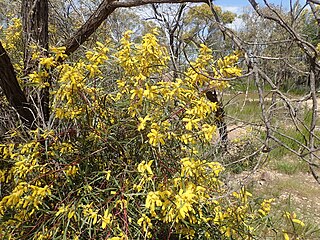
Acacia doratoxylon, commonly known as currawang, lancewood, spearwood or coast myall, is a shrub or tree belonging to the genus Acacia and the subgenus Juliflorae that is native to eastern and south eastern Australia.

Acacia mountfordiae, commonly known as Mountford's wattle, is a shrub or tree belonging to the genus Acacia and the subgenus Juliflorae that is native to north Australia.
Acacia spectrum, also known as Kimberley ghost wattle, is a shrub of the genus Acacia and the subgenus Plurinerves that is endemic to arid parts of north western Australia.

Acacia armillata is a tree of the genus Acacia and the subgenus Plurinerves that is endemic to north eastern Australia

Acacia hylonoma, commonly known as Yarrabah wattle, is a shrub of the genus Acacia and the subgenus Plurinerves that is endemic to a small area of north eastern Australia.


















